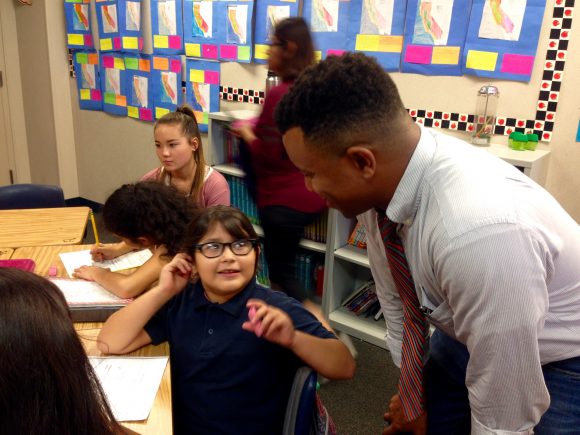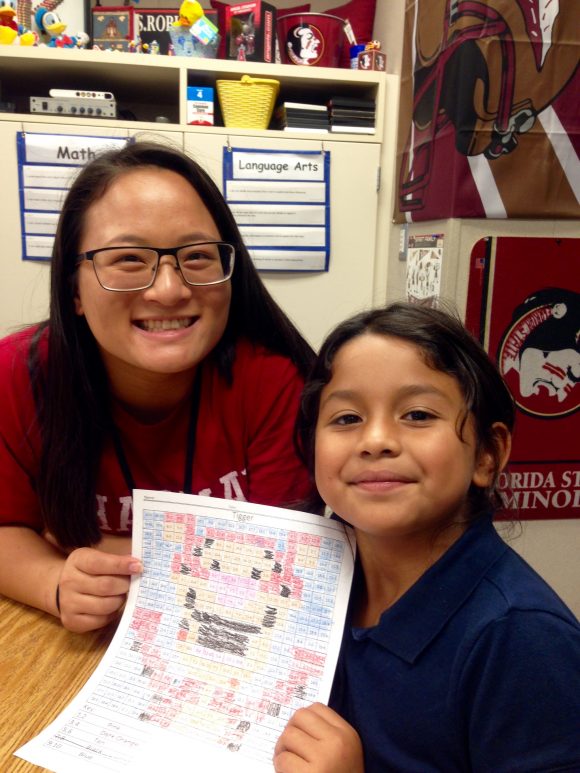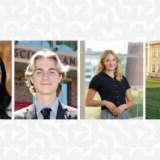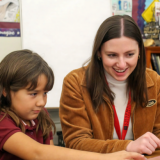Making the Community Your Classroom
October 16, 2017

Dr. Quaylan Allen working with a student from Higher Ground
By Cala Gin
“The whole city becomes your classroom,” shared Dr. Quaylan Allen, Assistant Professor of Integrated Educational Studies, as he described the impact of the new IES experimental course entitled “IES 206: Schools in Society at Higher Ground.” The class was launched this semester as part of an innovative approach to teach the interconnections between schools and the surrounding community resources. The most unique aspect of the class is its robust and consistent site-based learning at Higher Ground Youth and Family Services, a nonprofit organization that provides mentoring and enrichment programs for children and families living in underserved communities in Anaheim and Santa Ana.
IES 206, one of the few courses that all IES majors, minors, and clusters are required to take, did not initially include fieldwork in the curriculum due to challenges of finding a fieldwork site that worked for the students. However, because of the intellectual curiosity of Dr. Allen’s students, the curriculum has evolved. Dr. Allen credits the design of this course largely to student input, which revealed a strong interest among Attallah College students to conduct field-based and experiential learning.
In addition, Dr. Allen shared that a frequent criticism of higher education is that “theory is disconnected from practice.” However, by offering an entire semester through on-site learning with staff and students at Higher Ground for several hours each week, IES 206 demonstrates a shift from the traditional classroom environment, providing a real-world educational experience for students. Darliene Zepeda-Field, IES major and Leadership Studies minor, is one of thirteen students taking this course. She expressed, “I like the fact that [we are] half learning [course content] and half out with the kids”, pointing out the importance of splitting the class time between lessons and discussions, and directly interacting with the students at Higher Ground.
 The class, as Dr. Allen also noted, is a tangible lesson in the power of professional and social networks. Joe Baldo, the founder of Higher Ground, met Dr. Allen and Dr. Noah Golden (Assistant Professor of Integrated Educational Studies) at a professional development event for junior high students at South Junior High School in Anaheim. After Dr. Allen and Dr. Golden’s presentations, Joe reached out and introduced them to his organization. After visiting and learning more about Higher Ground, Dr. Allen believed that this site could satisfy the needs of students interested in working at schools or communities since the program would be anchored in a community-based school setting.
The class, as Dr. Allen also noted, is a tangible lesson in the power of professional and social networks. Joe Baldo, the founder of Higher Ground, met Dr. Allen and Dr. Noah Golden (Assistant Professor of Integrated Educational Studies) at a professional development event for junior high students at South Junior High School in Anaheim. After Dr. Allen and Dr. Golden’s presentations, Joe reached out and introduced them to his organization. After visiting and learning more about Higher Ground, Dr. Allen believed that this site could satisfy the needs of students interested in working at schools or communities since the program would be anchored in a community-based school setting.
Building on that foundation, Dr. Allen hopes that IES 206 students will begin to build their own professional network by interacting with educators from various industries and nonprofit organizations. He hopes that students will learn to ask questions, observe the skills required in today’s workforce, and see the differences between “on-paper versus real life” experiences in a culturally relevant manner. These experiences will be invaluable in preparing students for their senior capstone projects, sharpening their fieldwork research skills, and giving students experiences in both the community and school strands of IES.
“I don’t want to over-romanticize [the program],” Dr. Allen added. He understands that the current program is not perfect but will continue to undergo improvements and changes. The search for the balance between robust fieldwork experience and appropriate content knowledge is constantly on Dr. Allen’s mind. He realizes that the engagement with Chapman students – a rotation of once a week for one semester – is just a small fraction of the time that the students at Higher Ground need to grow.
On top of that, Dr. Allen is constantly assessing a variety of program needs, such as student transportation to Anaheim, classroom logistics, and finding optimal class schedules. However, Dr. Allen is optimistic that “taking the classroom out to the community [through IES 206] will allow for a much more immersive experience” for Chapman students. Instead of waiting for the next lecture to discuss their observations, students can immediately discuss and apply their knowledge, making the powerful connection between schools and society in the real-world. Using this course as a foundation, Dr. Allen hopes that students will be able to appreciate and “learn from and with the communities” in which they will be serving.

